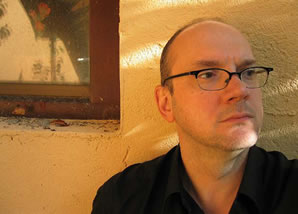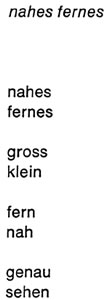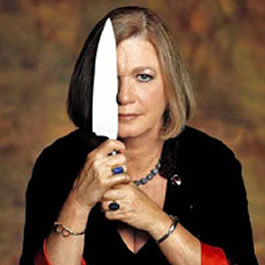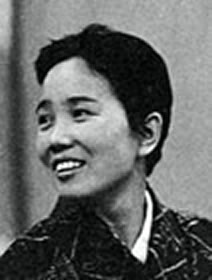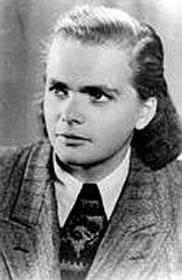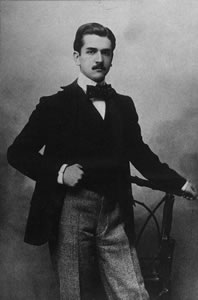De Duitse schrijver en journalist Axel Hacke werd geboren op 20 januari 1956 in Braunschweig. Zie ook alle tags voor Axel Hacke op dit blog.
Uit: Das Beste aus meinem Leben
„Manchmal wache ich nachts auf, der Rücken tut mir weh, ich bin steif wie ein Brett und schweiß-gebadet und denke, ich schaffe es alles nicht, die viele Arbeit und die Familie und die ganze Verantwortung und das Geldverdienen — ich schaffe es nicht. Warum kann ich nicht einen Schreibwarenladen haben, denke ich dann, einen kleinen Schreibwarenladen, in den die Leute hereinkommen und aus dem sie wieder herausgehen? Damischen kaufen sie etwas und lassen dafür ein bisschen Geld da, und ansonsten herrscht Ruhe. Oder warum besitze ich nicht eine Heißmangel, wo es den ganzen Tag nach frischer Wäsche riecht, und abends um halb acht sperrt man zu und geht nach Hause, und Schluss und Tagesschau? Das sei ja wohl nicht mein Ernst, sagt Paola dann zu mir: Was wüsste ich denn von den Problemen der Schreibwarenverkäufer und Heißmangelbesitzer!? Ich solle nicht immer nach Sicherheit und Ruhe suchen im Leben, sagt sie, ich solle es endlich einmal als Heraus-forderungsehen. »Das Leben«, rief sie einmal nachts, »ist ein Abenteuer.« Dann nahm sie mich in den Arm und tröstete mich und sagte, ich würde es schon schaffen, alles. Manchmal wache ich auf, weil mein Sohn schreit, Luis. Er ist gerade zwei Jahre alt, und dann und wann wird er wach und ist ganz verschwitzt und schreit einfach so, und dann und wann schreit er auch nicht einfach so, sondern er schreit: »Bügälnk“

Axel Hacke (Braunschweig, 20 januari 1956)
De Vlaamse dichter, rederijker en heelmeester Michiel de Swaen werd geboren in Duinkerke op 20 januari 1654. Zie ook alle tags voor Michiel de Swaen op dit blog.
Uit: Het leven en de dood van Jesus Christus
Aen Jesus Moeder hun verlegentheyt ontvouwen,
De minsaemheyt, die hy in haer gelaet bemerkt,
Maekt, dat hy syn gemoed door vaste hôp’ versterkt,
’t Gelukt hem naer syn wensch: de Moeder word bewoogen,
En legt haer lieven Soon den dienaers klagt voor oogen;
Maer ’t schynt, dat mynen Heer haer geenen troost aenbiet,
Hy segt: wat vraegt gy Vrouw, myn uer is hier nog niet.
Dees antwoord, die, in schyn, wat bitter was om hooren,
En kond’ in ’t minste deel des Moeder hôp’ niet stooren,
Sy segt de knechten: past wel op, en zyt bereyd,
Op dat gy alles doet, wat mynen Soon u seyd.
Daer waeren in de zael, ten dienste der genoden,
Ses kruyken, naer de wys en suyvering der Joden;
Den Saligmaker roept de dienaers en gebiet,
Dat m’in elk steene vat strakx suyver water giet.
Sy blyven op het woord van mynen Heyland hopen,
En gieten ieder kruyk soo vol dat s’overlopen;
Hier mede segt den Heer: schenkt nu uyt ’t eerste vat.
En geeft d’Hofmeester eens te proeven van dit nat.
Dien heeft het nauwelykx in synen mond genomen,
Of doet den Bruydegom terstond van tafel komen,
En seyd hem, g’heel gestoort: wie vat met wat beleyt,
Gy uwe Bruyloft-feest van daeg hebt aengeleyt?
Elk doet syn gasten eerst den besten wyn uytschinken,
Den slechtsten, als sy nu versaed zyn van te drinken,
Gy geeft den goeden wyn ten eynde van den dis,
En schenkt dien als den smaek nu schier verloren is.

Michiel de Swaen (20 januari 1654 – 3 mei 1707)
De bruiloft te Kana door Jan Cornelisz Vermeyen, 1535
De Tsjechische dichter, schrijver en filosoof Egon Bondy werd geboren op 20 januari 1930 in Praag. Zie ook alle tags voor Egon Bondy op dit blog.
Uit: Journal de la fille qui cherche Egon Bondy (Vertaald door Marcela
Salivarova Bideau)
« Dans la chambre je voulais me laver de la poussière de la
journée
mais sale et collante de transpiration comme j’étais
il m’a forcée sur le plancher
Pour ne pas me salir encore davantage
je lui ai fait le pont
Sûrement du jamais vu pour lui ça l’a terriblement excité
de voir comment ce petit trou le nargue
Au moment où il s’est penché en avant pour s’en servir
j’ai vu sur le mur en face le tableau dans le miroir
Quand soudain j’ai vu cette taille étroite ce ventre qui
s’estompe et le bassin qui dépasse
Toute cette silhouette mincelette au-dessus de laquelle
ne se dressaient que les seins
j’ai ressenti un étonnement inattendu
où vais-je seulement caser ce membre
Et quand j’ai vu comment il entre
et comment il s’engouffre en moi »
je n’arrivais pas à comprendre où il disparaissait
et voilà qu’il ressort
et replonge encore là
où d’après le reflet dans le miroir on devrait à peine
enfourner la moitié
et j’ai été si sidérée et fascinée par ce théâtre
qui se prolongea quelques minutes
que j’ai d’abord complètement oublié de réaliser que je
l’avais en moi

Egon Bondy (20 januari 1930 – 9 april 2007)
De Japanse schrijfster Sawako Ariyoshi werd geboren op 20 januari 1931 in Wakayama. Zie ook alle tags voor Sawako Ariyoshi op dit blog.
Uit: Les années du crépuscule (Vertaald door Jean-Christian Bouvier)
“Depuis qu’il avait frôlé la mort, Shigezo avait d’une certaine manière franchi les limites habituelles du grand âge. Il avait sur le visage une expression candide qu’Akiko ne lui avait jamais vue. Lui, qui était toujours mécontent et ne cessait de se plaindre, souriait avec les yeux sans rien dire ni même ouvrir la bouche. Kyoko et Akiko qui ne l’avaient, ni l’une ni l’autre, jamais vu satisfait ou heureux n’en revenaient pas. Était-ce le contrecoup de la pneumonie? En tout cas un sourire angélique éclairait désormais son visage. Il souriait quand Akiko devinait ce qu’il désirait, quand elle lui servait à manger ou chaque fois qu’elle le faisait venir près d’elle. De temps à autre, assis tout seul, il se mettait à sourire sans raison.
Satoshi avait le même sourire juste après sa naissance. Je me demandais à quoi il pouvait bien rêver puisque ses yeux ne distinguaient pas encore le monde extérieur, mais le docteur m’a expliqué qu’il souriait simplement aux anges. C’est vrai que les bébés ont l’air de petits anges. J’ai l’impression que c’est la même chose pour grand-père… Est-ce ainsi qu’un homme devient un bouddha? »
(…)
“A l’époque féodale, les paysans étaient maintenus dans un état de subsistance minimale. C’est pareil avec la médecine d’aujourd’hui, elle empêche les vieillards de mourir sans les faire vivre pour autant.
– Mais “Papy Bonjour ” vit : il a toujours l’air transporté dans un rêve merveilleux. C’est mieux que d’avoir le corps qui se détraque. Ma grand-mère souffre de rhumatismes, je t’assure qu’elle a le visage bien plus ridé que lui. Il a la chance de ne pas souffrir et de ne pas être malade! »
Après leur départ, Akiko réfléchit à la justesse de leurs observations. Il était vrai que les vieillards, aujourd’hui, au lieu de mourir, survivaient comme Shigezo dans un état euphorique de rêve éveillé. Était-ce un privilège accordé à ceux qui avaient traversé une longue vie? Aux yeux de Shigezo, Emi était sans doute un ange du paradis et l’oiseau dans la cage, Kalavinka, l’oiseau sacré du nirvâna.”

Sawako Ariyoshi (20 januari 1931 – 30 augustus 1984)
In 1961
De Zwitserse dichter en schrijver Eugen Gomringer werd op 20 januari 1925 geboren in Cachuela Esperanza, Bolivia. Zie ook alle tags voor Eugen Gomringer op dit blog.
Alleen
Alleen
Alleen und Blumen
Blumen
Blumen und Frauen
Alleen
Alleen und Frauen
Alleen und Blumen und Frauen und
ein Bewundere
entropie ist schön
entropie ist schön
das gegenteil ist schön
wachstum ist schön
veränderung ist schön
dasein ist schön
ordnung ist schön
das gegenteil ist schön
materie ist schön
energie ist schön
botanik ist schön
sanskrit ist schön
das gegenteil ist schön
verzieht ist schön
irrtum ist schön
bedeutung ist schön
wahrheit ist schön
das gegenteil ist schön
entropie ist schön

Eugen Gomringer (Cachuela Esperanza, 20 januari 1925)
De Franse dichter en schrijver Raymond Roussel werd geboren op 20 januari 1877 in Parijs. Zie ook alle tags vooor Raymond Roussel op dit blog.
Uit: La Vue
Quelquefoi un reflet momentané s’allume
Dans la vue enchassée au fond du porte-plume
Contre lequel mon oeil bien ouvert est collé
A très peu de distance, à peine reculé:
La vue est mise clans une boule de verre
Petite et cependant visible qui s’enserre
Dans le haut, presque au bout du porte-plume blanc
Où l’encre rouge a fait des taches, comme en sang.
La vue est une très line photographie
Imperceptible, sans doute, si l’on se fie
A la grosseur de son verre dont le morceau
Est dépoli sur un des côtés, au verso;
Mais tout enfle quand l’oeil plus curieux s’approche
Suffisamment pour qu’un cil par moments s’accroche.
Je tiens le porte-plume assez horizontal
Avec trois doigts par son armature en métal
Qui me donne au contact une impression fraiche;
Mon oeil gauche fermé complètement m’empêche
De me préoccuper ailleurs, d’être distrait
Par un autre spectacle ou par un autre attrait
Survenant au dehors et vus par la fenêtre
Entr’ouverte devant moi.
Mon regard pénètre
Dans la boule de verre, et le fond transparent
Se précise; ma main, en remuant, le rend.
Malgré ma volonté, fugitif et peu stable;
Il représente toute une plage de sable
Au moment animé, brillant; le temps est beau;
Des clartés rares et minces courent sur l’eau
S’arrondissant suivant le hasard de la houle;
Des promeneurs et des enfants forment la foule
Presque totalement oisive; il fait du vent
Si l’on en croit certains fronts penchés en avant;
On voit même un chapeau de paille qui s’envole.
Car son propriétaire, un peu trop bénévole,
N’a pas compté sur la brise et sur sa fraicheur.

Raymond Roussel (20 januari 1877 – 14 juli 1933)
Cover biografie
De Duitse dichteres en schrijfster Edeltraud Eckert werd geboren op 20 januari 1930 in Hindenburg. Zie ook alle tags voor Edeltraud Eckert op dit blog.
Vom Leben trennt dich Schloss und Riegel
Vom Leben trennt dich Schloss und Riegel
Und deiner Muße bleibt nur eins:
Du schaust in den blind gewordenen Spiegel
Deines eigenen vergangenen Seins.
Ein bleiches Bild sieht dir entgegen,
Von keines Künstlers Hand verschönt,
Du ließest dich in Fesseln legen,
Und frei zu sein hast du ersehnt.
Vielleicht, dass sich dein Morgen naht,
Vielleicht bringt auch die Nacht die Wendung,
Du weißt noch nicht, führt dieser Pfad
Zum Wahnsinn oder zur Vollendung.

Edeltraud Eckert (20 januari 1930 – 18 april 1955)
De Hongaarse schrijver Imre Madách werd geboren op 20 januari 1823 in Dolná Strehová in het huidige Slowakije. Zie ook alle tags voor Imre Madách op dit blog.
Uit: Die Tragödie des Menschen (Vertaald door Jenő Mohácsi en Geza Engl)
DER HERR.
Ha, aus den Augen mir, abtrünn’ger Geist!
Könnt’ dich vernichten wohl, doch thu’ ich’s nicht.
Magst ringen los von allen Geistesbanden,
Im Staube niedrig, ein verpönter Wicht;
Und so gehaßt, verstoßen und verlassen
Sollst reuevoll zur Einsicht kommen erst,
Daß du umsonst an deiner Kette zerrst,
Mit Gott im Kampfe nimmer Fuß wirst fassen.
LUCIFER.
Ach nein, so leicht stößt du mich nicht von hinnen,
Wie schnödes Werkzeug, unbrauchbar geworden!
Selbander schufen wir, drum fordere
Ich meinen Anteil.
DER HERR spottend.
Gut, du sollst ihn haben.
Auf Erden dort, im Paradiese, sieh’,
Zwei schlanke Bäume. Ich verfluche sie,
Dann nimm dir beide hin, sie seien dein.
LUCIFER.
Karg mißt du deine Gaben zu, wahrhaftig!
Je nun, du bist ja ein gar großer Herr,
Und denkst, mir muß ein Fußbreit Raum genügen.
Hat die Verneinung nur den kleinsten Halt,
Hebt deine Welt sie aus den Angeln bald.
Bricht auf.
CHOR DER ENGEL.
Aus Gottes Angesicht, Verruchter, fort!
Heil dem Gesetzesquell, Heil unserm Hort

Imre Madách (20 januari 1823 – 5 oktober 1864)
Cover












